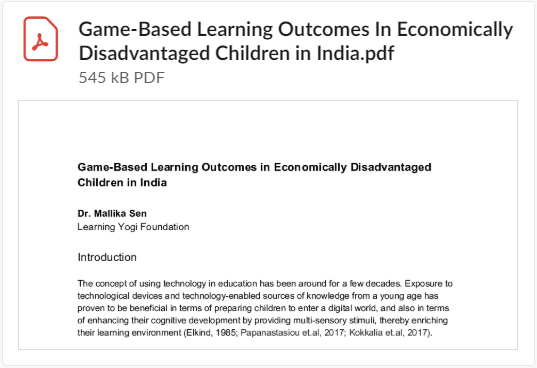
Proven Impact
The Atlas Mission has been proven to produce significant improvements in children’s learning outcomes.
For instance, in a study conducted in Bangalore (India), children who played with the Atlas Mission for a month increased their vocabulary by 50% and their reading scores by 75%.
More importantly, they were able to use the skills they had learned by playing the game to read out novel words which they had not been exposed to in the game, demonstrating learning at a much deeper and conceptual level.
Review the results of the study.
Research Driven Curriculum
The technology and curriculum behind the Atlas Mission is inspired by more than 10 years of field research conducted at the Carnegie Mellon University and at the University of California, Berkeley. Here are a few published research papers that have inspired Learning Yogi’s technology and curriculum:
An exploratory study of unsupervised mobile learning in rural India. Proceedings of ACM Conference on Human Factors in Computing Systems (CHI ’10), Atlanta, Georgia, April 10-15, 2010. (Acceptance rate: 22%) Best Paper Honorable Mention (i.e. top 5%)
Improving literacy in rural India: Cellphone games in an after-school program. Proceedings of IEEE/ACM Conference on Information and Communication Technology and Development (ICTD ’09), Doha, Qatar, April 17-19, 2009. (Acceptance rate: 18%)
Designing digital games for rural children: A study of traditional village games in India. Proceedings of ACM Conference on Human Factors in Computing Systems (CHI ’09), Boston, Massachusetts, April 4-9, 2009. (Acceptance rate: 25%) Best Paper Honorable Mention (i.e. top 5%).
Designing e-learning games for rural children in India: A format for balancing learning with fun. Proceedings of ACM Conference on Designing Interactive Systems (DIS ’08), Cape Town, South Africa, February 25-27, 2008. (Acceptance rate: 24%)
Mobile gaming with children in rural India: Contextual factors in the use of game design patterns. Proceedings of 3rd Digital Games Research Association International Conference (DiGRA ’07), Tokyo, Japan, September 24-28, 2007.
Localized iterative design for language learning in underdeveloped regions: The PACE framework. Proceedings of ACM Conference on Human Factors in Computing Systems (CHI ’07), San Jose, California, USA, April 28-May 3, 2007, 1097-1106. (Acceptance rate: 22%)

